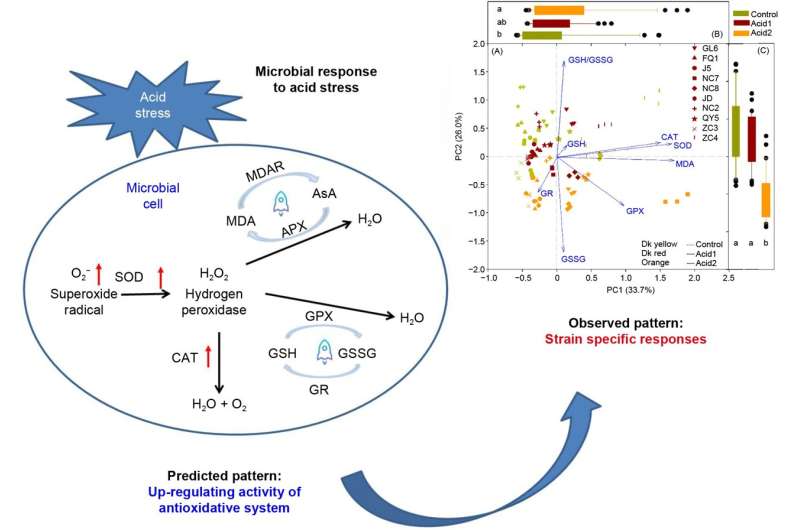This article has been reviewed according to Science X's editorial process and policies. Editors have highlighted the following attributes while ensuring the content's credibility:
fact-checked
proofread
Study finds 10 Bacillus strains can regulate antioxidative system in response to acid stresses

Soil acidification is widely occurring in diverse terrestrial ecosystems and soil microbial communities have been reported to be highly sensitive to changes in soil pH. Soil microbes could regulate their physiological conditions to make them survive under the acidifying conditions.
A study appearing in Soil Ecology Letters demonstrates that 10 Bacillus strains are able to regulate the antioxidative system differently in response to the decreasing environmental pH condition, and therefore have different acid tolerance capacity.
A series of studies have been conducted by Jiaen Zhang's team at the College of Natural Resources and Environment, South China Agricultural University, in order to clarify how acid rain and consequent soil acidificiation would affect the soil microbial community composition and functions.
In previous studies, they found that soil acidification could greatly change the composition and distribution of soil biota including microbial and faunal communities. Changing soil microbial community composition consequently influenced the microbe driving ecosystem functions such as the decomposition and sequestration of soil organic carbon.
They considered that different individual responses to acidifying environmental conditions could explain the acid-induced changes in the soil microbial communities. Therefore, they conducted a series of incubation experiments to investigate the acid tolerance capacity and physiological response of different microbial strains to acid stress.
In this study, they found that 10 Bacillus strains had obviously different pH tolerance thresholds, in spite of the close phylogenetic classification among strains.
Acid stresses exerted significant effects on microbial antioxidative system, including superoxide dismutase, catalase, and glutathione transferring enzymes and reactants, but the effects were strain-specific.
Different microbial strains could have different investment strategies of energy and resources and therefore regulated different processes to cope with acid stresses. The principal component analysis indicated that several microbial strains preferentially regulated the activities of superoxide dismutase and catalase and the content of malondialdehyde, while others preferred to change the contents and ratio of oxidized and reduced glutathione reactants under acid stress.
These results highlight the heterogeneity of microbial physiological responses to acidifying environmental conditions, consequently contributing to acid-induced alterations in soil microbial community composition and diversity.
"The study furthers our understanding of the responses of soil microbes to soil acidification from the perspective of microbial physiology, highlighting the necessity to study microbial responses to environmental changes from different scales, and the observations obtained at the microscale may help explain the pattern of soil microbial community changing at the large scales."
Soil microbial communities drive multiple ecological processes such as mineralization and stabilization of soil organic carbon and element cycling, as well as the ecosystem stability under climate changes. Under different scenarios of environmental changes, divergent individual-level responses of soil microbes may contribute to changes in the soil microbial community composition and therefore alter the microbe driving soil ecological functions.
More information: Xiaoran Shan et al, Divergent responses of growth rate and antioxidative system of ten Bacillus strains to acid stresses, Soil Ecology Letters (2023). DOI: 10.1007/s42832-023-0192-4
Provided by Higher Education Press




















